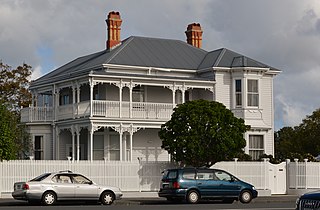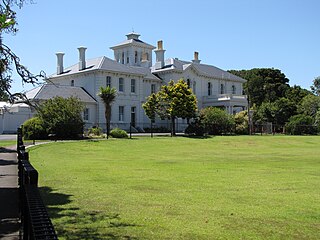
Queen Street is the major commercial thoroughfare in the Auckland CBD, Auckland, New Zealand's main population centre. The northern end is at Queens Wharf on the Auckland waterfront, adjacent to the Britomart Transport Centre and the Downtown Ferry Terminal. The road is close to straight, the southern end being almost three kilometres away in a south-southwesterly direction on the Karangahape Road ridge, close to the residential suburbs in the interior of the Auckland isthmus.

Herne Bay is a suburb of Auckland, New Zealand. It is located on the southwestern shore of the Waitematā Harbour to the west of the Auckland Harbour Bridge. It is known for its extensive harbour views, marine villas and Edwardian age homes. Herne Bay has been a prosperous area since the 1850s due to its outlook over the Waitemata Harbour. It ranked as the most expensive suburb in New Zealand in 2015. In 2021 it again topped rankings of the most expensive suburbs in New Zealand, with a median property value of $3.25 million.

Tūrangawaewae is a marae and a royal residence in Ngāruawāhia, Waikato, New Zealand. It is the official residence of the Māori monarch and the administrative headquarters of the Kīngitanga movement. Of its numerous buildings, the two principal ones are the Māhinārangi meeting house, and Tūrongo House, which is official residence of the queen or king.

Freemans Bay is the name of a former bay and now inner city suburb of Auckland, in the North Island of New Zealand. The bay has been filled in to a considerable extent, with the reclamation area now totally concealing the ancient shoreline. Historically a poor and often disreputable quarter, it is now a comparatively wealthy and desirable neighbourhood known for its mix of heritage homes and more recent single-dwelling houses, as well as for its two large parks.

Grey Lynn is an inner suburb of Auckland, New Zealand, located 3 kilometres (1.9 mi) to the west of the city centre. Originally a separate borough, Grey Lynn amalgamated with Auckland City in 1914.

Ponsonby is an inner-city suburb of Auckland located 2 km west of the Auckland CBD. The suburb is oriented along a ridge running north–south, which is followed by the main street of the suburb, Ponsonby Road.

The Italianate style was a distinct 19th-century phase in the history of Classical architecture. Like Palladianism and Neoclassicism, the Italianate style combined its inspiration from the models and architectural vocabulary of 16th-century Italian Renaissance architecture with picturesque aesthetics. The resulting style of architecture was essentially of its own time. "The backward look transforms its object," Siegfried Giedion wrote of historicist architectural styles; "every spectator at every period—at every moment, indeed—inevitably transforms the past according to his own nature."

Glen Eden railway station is located on the Western Line of the AT Metro rail network in Auckland, New Zealand. The station building is a local historical landmark, and was restored and relocated from the eastern to the western side of the railway corridor in 2001. A restaurant is currently located in the old station building.

Parnell is a suburb of Auckland, New Zealand. It is one of New Zealand's most affluent suburbs, consistently ranked within the top three wealthiest, and is often billed as Auckland's "oldest suburb" since it dates from the earliest days of the European settlement of Auckland in 1841. It is characterised by its mix of tree-lined streets with large estates; redeveloped industrial zones with Edwardian town houses and 1920s bay villas; and its hilly topography that allows for views of the port, the Waitematā Harbour, Rangitoto Island and the Auckland Domain. To its west lies the Auckland Domain, to the south Newmarket, and to the north the Ports of Auckland.

Princes Street is a major street in Dunedin, the second largest city in the South Island of New Zealand. It runs south-southwest for two kilometres from The Octagon in the city centre to the Oval sports ground, close to the city's Southern Cemetery. North of The Octagon, George Street continues the line of Princes Street north-northeast for two and a half kilometres. Princes Street is straight but undulating, skirting the edge of the City Rise to its northwest. The part of the street immediately below The Octagon is the steepest section, as the road traverses an old cutting through Bell Hill.

Te Kāhui Whaihanga New Zealand Institute of Architects (NZIA) is a membership-based professional organisation that represents approximately 90 per cent of registered architects in Aotearoa New Zealand and supports and promotes architecture in New Zealand.

St Paul's Church is an historic Anglican church, located on Symonds Street near the University of Auckland and Auckland University of Technology, in the central business district of Auckland, New Zealand. The church is the longest established parish in the city and has one of the largest Anglican congregations in Australasia.

The Pah Homestead is a historic home located in the suburb of Hillsborough in Auckland, New Zealand, within the bounds of Monte Cecilia Park. It is owned by the Auckland Council, and is currently used as an art gallery, housing the Arts House Trust collection of New Zealand art. Since opening in August 2010, the gallery has attracted over 410,000 visitors, including 130,000 in its first year

University House is a 19th-century building in Auckland, New Zealand, that originally served as the synagogue for the Auckland Hebrew Congregation. The building is situated on Princes Street, adjacent to Albert Park, and is now occupied by the University of Auckland.
William Alfred Holman was a New Zealand architect and a member of the New Zealand Institute of Architects who designed prominent commercial and residential buildings in Auckland as well as Whangārei, Hamilton, Gisborne and Christchurch.

The New Zealand Institute of Architects Gold Medal is an award presented annually by the Te Kāhui Whaihanga New Zealand Institute of Architects (NZIA) to a New Zealand architect.

Laurence Jeremy Elder Salmond was a New Zealand conservation architect. He received the NZIA Gold Medal, the highest honour in New Zealand architecture, in 2018.
Lillian Jessie Chrystall was a New Zealand architect. She was the first woman to receive a national New Zealand Institute of Architects award.

Symonds St Public Conveniences and Former Tram Shelter is a category 2 historic place in Auckland New Zealand, and included the first standalone women's public toilets in Auckland.

Te Kāinga Aroha is a category 1 historic place in Auckland, New Zealand.






















